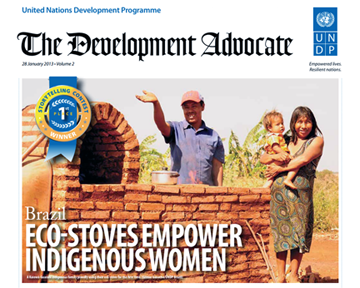

Account of MDG-F's eco-stoves wins UNDP story-telling contest

"Eco stoves empower indigenous women," a story that recounts the work of the MDG-Fund in Brazil, has won first prize in the annual Story-telling Contest organized by the United Nations Development Programme (UNDP).
The report, prepared by the UNDP team in Brazil, appears in the second edition of "The Development Advocate," an annual publication that highlights the twelve projects that best exemplify the results achieved by the UNDP in its commitment to global development.
The silver medal this year went to a report by the UNDP team in Bangladesh entitled "Empowering women to fight poverty", while the bronze was presented to a story from China entitled "Farmers plant a seed for a chemical-free future", both also published in the journal.
"As in last year's edition, these stories highlight the crucial role of the UNDP in the areas of poverty reduction, democratic governance, crisis prevention and recovery, and environment and sustainable development," said UNDP Administrator Helen Clark, announcing the twelve winning stories this week in New York.
Ms. Clark noted that the theme of the stories -- which are chosen by a 12-person jury -- is change and the benefits the UNDP brings to the lives of the "poor and vulnerable" of the planet. Every story, she said, illustrates the agency's motto "to serve people and nations" because people "are and will always be the center of UNDP's work."
The story contest, being held this year for the second time, was launched by the UNDP last September as part of an effort to motivate employees to put a human face to its success stories. In all, the jurors considered 120 stories from 66 countries.
Besides the three winning stories in this second edition, "The Development Advocate" this year also includes nine other texts from UNDP offices in countries as diverse as the Democratic Republic of Congo (DRC), Ethiopia and Sudan, Colombia, Kazakhstan, Georgia, Mongolia, and the Occupied Palestinian Territory.
Eco stoves empower indigenous women
By Daniel de Castro and Jacob Said
Panambizinho, Brazil—The sun was still rising and Delma Gonçalves, 41, had already spent two hours trekking to the place where she and the rest of her settlement collected firewood. The return trip was even worse: under the hot sun, she carried a bundle of wood weighing 20 kilogrammes on her shoulder.
Gonçalves is a member of the Kaiowá Guarani indigenous people, the nation’s second largest indigenous group, who live on the Panambizinho land located 250 kilometres from the capital city of Mato Grosso do Sul state in westcentral Brazil. Three times a week, for many years, this has been Gonçalves’s morning routine.
“I had a really sore back. I would get home so tired that I couldn’t find the energy to cook,” says Gonçalves. Every day she would make the fire for lunch on the floor, using a few cans to protect it from the wind and a refrigerator cooling coil as an improvised grill.
In addition to worsening her back pain, the floor fire filled the house with smoke, hurting the health of Gonçalves’ children, who suffered from respiratory problems like asthma, pneumonia and bronchitis. But all this has started to change with the arrival of highefficiency wood stoves that have helped to transform the lives of dozens of indigenous families in Panambizinho.
Click here to read the whole story.
Click here to read about the MDG-F's work in Brazil.
Click to read Success Stories from our work fighting poverty and improving livelihoods around the world.